The South Carolina lease agreement organizes a tangible register recording the terms of a residential housing lease. Initially, the potential tenant will fill a preliminary application in order to determine if the individual meets the required qualifications of the landlord. Once approved, the contract can be revised to the specifications of the mutual needs of the lessor and lessee and then signed to solidify the arrangement.
Lease Agreements By Type
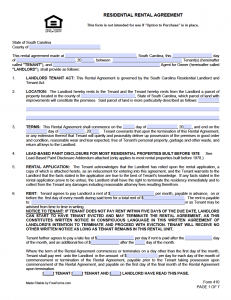 Association of Realtors Version – The state’s realtor group offers a fully equipped rental agreement that may be executed by any individuals partaking in the leasing of a property.
Association of Realtors Version – The state’s realtor group offers a fully equipped rental agreement that may be executed by any individuals partaking in the leasing of a property.
Download: PDF
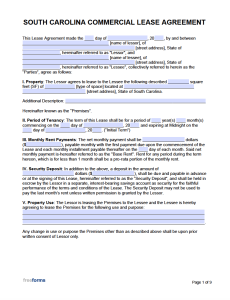 Commercial Lease Agreement – Legalizes the commitment between an owner and renter of property secured for a company’s operation.
Commercial Lease Agreement – Legalizes the commitment between an owner and renter of property secured for a company’s operation.
Download: PDF, Word (.docx)
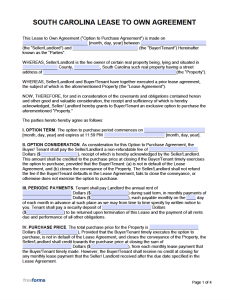 Lease to Own Agreement – Is utilized to enter into a real estate rental contract with an extended opportunity to purchase the property at the end of the lease.
Lease to Own Agreement – Is utilized to enter into a real estate rental contract with an extended opportunity to purchase the property at the end of the lease.
Download: PDF, Word (.docx)
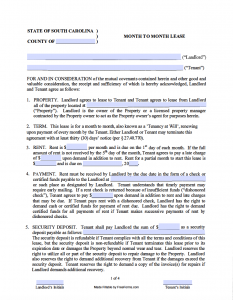 Month-to-Month Lease – Describes the conditions of an arrangement to lease a space for a given period and monthly premium with the preference to terminate with thirty (30) day notification or more for either the owner or tenant.
Month-to-Month Lease – Describes the conditions of an arrangement to lease a space for a given period and monthly premium with the preference to terminate with thirty (30) day notification or more for either the owner or tenant.
Download: PDF
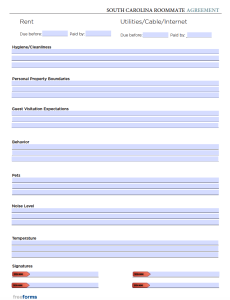 Roommate Agreement – Identifies the relationship, clauses, and obligations between a tenant of a residence and an alternate person choosing to occupy the same building.
Roommate Agreement – Identifies the relationship, clauses, and obligations between a tenant of a residence and an alternate person choosing to occupy the same building.
Download: PDF
Standard Lease Agreement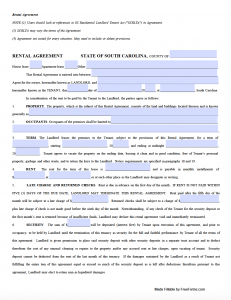 – Warrants a tangible commitment to lease a property for a signified period for a predetermined monthly sum.
– Warrants a tangible commitment to lease a property for a signified period for a predetermined monthly sum.
Download: PDF, Word (.docx)
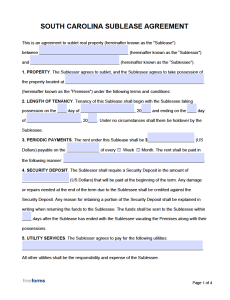 Sublease Agreement – Verifies the particulars to a written document arranging for a tenant to rent a leased unit to another entity.
Sublease Agreement – Verifies the particulars to a written document arranging for a tenant to rent a leased unit to another entity.
Download: PDF, Word (.docx)
Additional Forms
General Contract Addendum (Form 390) – This form allows users to stipulate that a certain action must be carried out prior to the tenant moving in or during the course of the occupancy.
Landlord-Tenant Laws
The extended version of statutes discussing conduct and responsibilities involved in the relationship of a lessor and lessee are covered in the South Carolina Code of Laws Unannotated Residential Landlord and Tenant Act § 27-40.
Required Landlord Disclosures
Identification of the Landlord or Authorized Agents (§ 27-40-420) – Any lessor entering into a leasing agreement must inform the lessee of the name and address of the owner, as well as any agents authorized to act on the owner’s behalf. Should this information change within the duration of the lease, the tenant must be updated to the change.
Differing Security Deposits (§ 34-11-410a) – For adjacent multi-unit properties of four or more, the landlord has the right to request different security amounts for the separate units. If the owner elects to do so, they must either produce a reasonable accounting breakdown of the contrasting character in units and accompanying dollar amounts for the distinctions. This documentation must be either posted in plain view in the building or delivered to the tenants.
Lead-Based Paint (42 U.S. Code § 4852d) – The federal government mandates that information be included on the possibility of the presence of lead-composed to be found in homes built before 1979. Materials educating the lessee of the precautions to take with lead-composed paint and warning signs of exposure must be distributed before or at the time of lease endorsement.
When is Rent Late?
State law asserts that rent shall be paid as confirmed with the language within the executed leasing document. There is no defined amount of time in which rent is legally permitted to be submitted past the due date (§ 34-40-310c).
Late Fees
It is required that late fees be imposed within the written lease to be enforceable upon a tenant. Late fees are viewed as “rent” should a lessor have to go through legal channels to be compensated for overdue payments (§ 34-40-210).
NSF Checks
Rental payment checks that bounce upon deposit will carry a charge of no more than $30 for each occurrence. It is recommended that the amount per returned check be included in the conditions of the lease (§ 34-11-70).
Security Deposit Maximum
There is no designated limit on the deposit amount an owner can request as security for the property. The total security deposit can be negotiated between the landlord and tenant to be included in the leasing paperwork.
Security Deposit Return
The landlord has thirty (30) days to furnish a returned security deposit either after the lease term has terminated, or the landlord has taken repossession of the dwelling. For properties incurring physical destruction due to the actions of a tenant, the landlord can withhold a reasonable portion of the funds for repairs. In the case of damage, what remains of the deposit and a written summary of the defects to the property must be sent to the tenant within thirty (30) days (§ 34-11-410a).
Landlord’s Entry
The landlord is required to give advanced notice of at least twenty-four (24) hours to enter the premises of a tenant-occupied domicile legally. Exceptions to this rule are that the landlord may gain entry in emergency situations and regular-scheduled maintenance for tenant-initiated requests during normal business hours. The tenant may not illegitimately restrict the landlord from entering to maintain the property (§ 27-40-530a).


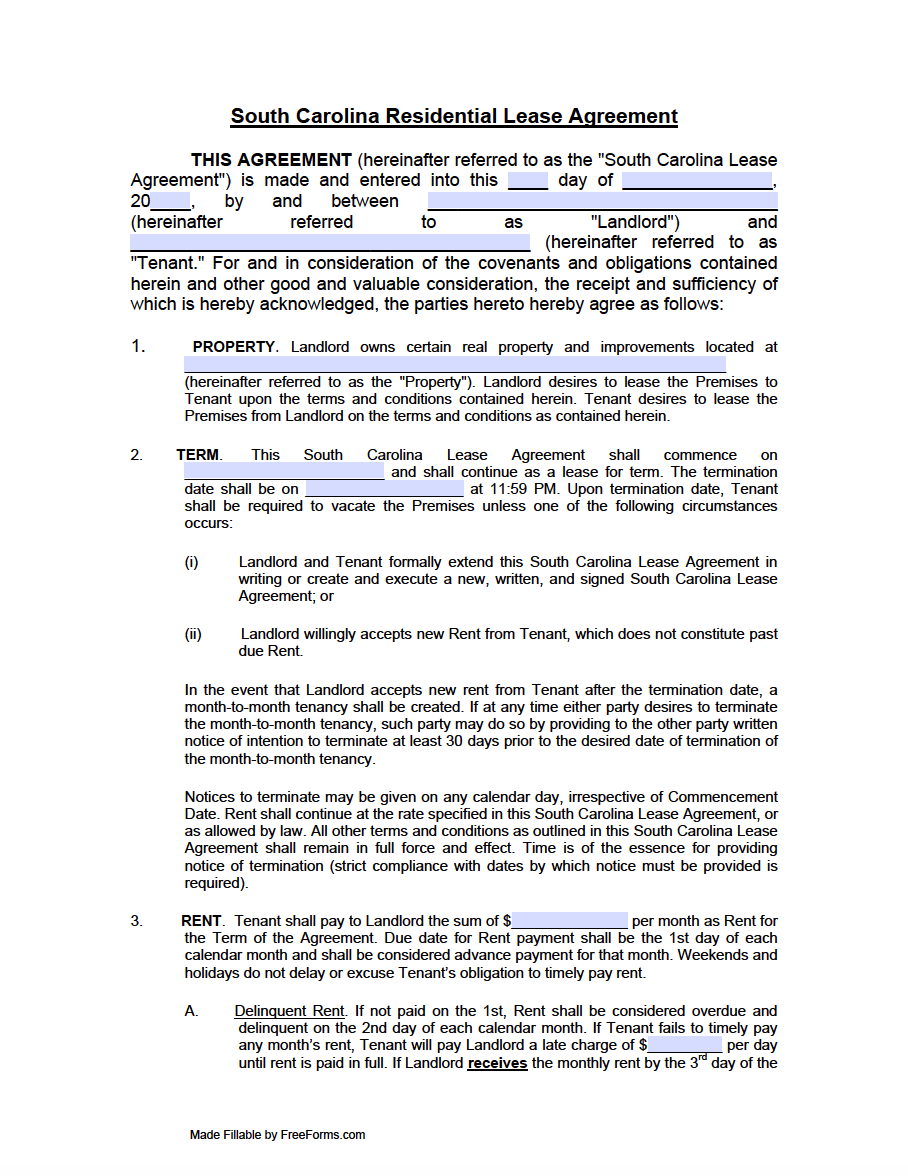
0 comments
Comments are closed.